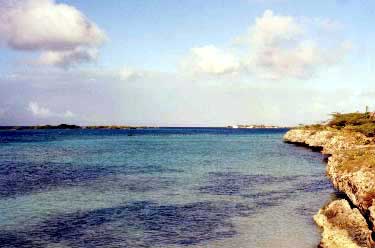Tiempo Climate Cyberlibrary
Adaptation - a Caribbean View
 |
Neville Trotz argues that responding to climate
change requires increasing current resilience to
climate variability.
|
|
The author spearheads Caribbean efforts to
build capacity for adaptation to climate change under
the auspices of projects funded by the Global
Environment Facility and the Canadian International
Development Agency.
|
The Barbados
Programme of Action, articulated at the Small Island
Developing States (SIDS) Conference (1994), identified
climate change as a priority issue for the small island and
low lying coastal Caribbean states. Caribbean countries
have focused their response to this threat on building
national capacity for adaptation, while pressing at
international fora for increased mitigation efforts from
Annex 1 countries.
Disasters threaten development efforts in the region by
diverting scarce development resources to disaster response
activities. Most disasters are linked to climate, and
underline the existing vulnerability of the region to
climate variability. Floods, droughts, forest fires and
landslides are all associated with the El Niño
phenomena.
Average regional annual temperatures increased by at
least 0.5 degrees C between 1900 and 1995. Precipitation is
decreasing, and sea level rise threatens coastal areas,
where most people live and work. Although the extent of
future climate change risk is unclear, it is certain that
climate change will exacerbate present-day regional
vulnerability to climate variability. Serious loss of lives
and livelihoods from recent heavy rainfall and floods in
Haiti and the Dominican Republic provide evidence of
this.
Immediate action is required to increase current
resilience to risks arising from climate variability in
order to improve capacity to respond to long-term climate
change and ensure sustainable development in the
region.
Adaptation in the region is informed by the urgent need
to respond to risks arising from climate variability. This
approach has been adopted by the GEF-funded Caribbean
Planning for Adaptation to Climate Change project, and the
preparation of National Adaptation Plans of Action.
Regional and national consultations have improved
understanding of perceptions of vulnerability to climate
variability, capacity to cope and effective current
responses.
We have learnt that adaptation is not a novel science;
many solutions (such as Integrated Coastal Zone Management,
Integrated Water Resources Management, Land Use Planning)
have existed for some time. Only the resources and the
commitment to implement them are missing. The need to
institute and finance these solutions becomes more urgent
with the threat of climate change.
Most SIDS suffer from a lack of capacity and limited
availability of data for rigorous climate and vulnerability
studies. The ‘bottom-up’ approach to
adaptation, therefore, provides a valuable alternative to
approaches now in vogue. The region looks forward to the
availability of resources to facilitate reduction of
vulnerability to climate variability - a legitimate
approach to the longer-term goal of adaptation to climate
change.
Comment
You can comment on this article by visiting the
Tiempo Climate Newswatch Forum.
Further information
Neville Trotz, ACCC Project Implementation Unit, Lazaretto
Complex, Black Rock, St Michael, Barbados. Fax: +246
4170461. Email: trotzcpacc@sunbeach.net.
On the Web
The Tiempo Climate Cyberlibrary lists
Small Island States websites.

